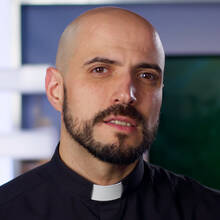A Reflection for Saturday of the Fifth Week in Ordinary Time
Find today’s readings here.
As the second account of creation in Genesis concludes, the narrator leaves us with a striking detail: “The man and his wife were both naked, yet they felt no shame” (Gn 2:25). In film and television, scenes of gratuitous sex or nudity often serve to capture the viewer’s attention rather than advance the plot. If this line were read in isolation, it might seem a mere tease. Instead, it sets the stage for what follows in the very next chapter—which we read from today—almost like a cliffhanger at the end of an episode.
In this moment, the man and woman’s exposed skins affirm their total openness. Their vulnerability is not a source of shame but a testament to the purity of their bond—of total intimacy and connection with one another and with God.
Then comes the fall. With the taste of the forbidden fruit, everything changes. Suddenly, Adam perceives his nakedness not as an invitation to vulnerability but as something to hide from others—even from God... “I heard Your voice in the garden, and I was afraid because I was naked; and I hid myself” (Gn 3:10), Adam says. Shame enters his heart like a shadow, casting a veil over his innocence. The openness, once unmarred, now gives way to fear, separation, and self-consciousness.
This shift, this rupture, is not only the story of Adam and Eve. It is the story of all of us. How often, in our own lives, do we feel the sting of shame? How often do we hide—from God, from others, or even from ourselves?
This shift from the naked truth of our being—our unvarnished openness—to a cool, guarded distance is, in part, a necessary stage of human growth. It shields us from exploitation and superficial relationships. Yet even this protection comes at a cost. It makes us wary and untrusting, and allows shame to take root and fester. Over time, self-preservation becomes not just a safeguard against harm but a barrier to the vulnerability and intimacy essential for true human and divine connection. But if we are attentive, we will become attuned to God’s calling from within our shame—if we dare to trust in one more person, the one who will never let us down, abandon us or prey on our vulnerability. God’s voice beckons us just as it did Adam and Eve in the garden: “Where are you?” (Gn 3:9). This question is not one to garner accusation but an invitation to come forth and be seen, not in their—our—perfection but in our brokenness. It is a call to step into the light, let go of shame, and be fully known, loved and restored through the embrace of grace.
The evil one knows this shame well, whispering in our hiddenness, sowing doubt and shame, urging us to retreat further into ourselves, away from the love and healing God offers. Saint Ignatius also understood this human temptation to hide—our impulse to conceal our darkest feelings, base instincts and deepest fears. He recognized how the enemy works, exploiting our vulnerabilities to keep us from the liberating truth of who we are in God’s eyes. The more we remain silent, the stronger the enemy’s grip becomes, trapping us in isolation and fear.
That is why St. Ignatius, in the First Week of the Spiritual Exercises, urges us in his 13th Rule for Discernment to bring our struggles into the light—to disclose our shame, fears, and the facets of ourselves we deem most unlovable. The enemy of our human nature thrives in secrecy, seeking to keep us trapped in fear and isolation. Secrecy is the enemy’s stronghold, and isolation its weapon. As Ignatius writes, “when the enemy of human nature turns his wiles and persuasions upon an upright person, he intends and desires them to be received and kept in secrecy.” But, he continues, “when the person reveals them to his good confessor or some other spiritual person who understands the enemy’s deceits and malice, he is grievously disappointed” (Spiritual Exercises, No. 326).
The enemy wants to keep us silent so that we remain captive to deception. But when we dare to reveal our struggles—whether to a trusted friend, a spiritual guide, before God in prayer, or in the Sacrament of Reconciliation—we break the enemy’s hold. In speaking the truth, we expose deception and step back into the freedom and grace that God offers.
Far from the fleeting and exploitative scenes that often capture our attention in the media, God’s gaze is steady and enduring. It is a gaze of love—one that sees us fully, with closeness, compassion and tenderness, never objectifying or exploiting us. God’s desire for us is not momentary or driven by superficial attraction; it is an eternal love story, a far cry from the passing spectacle of a steamy movie scene.








